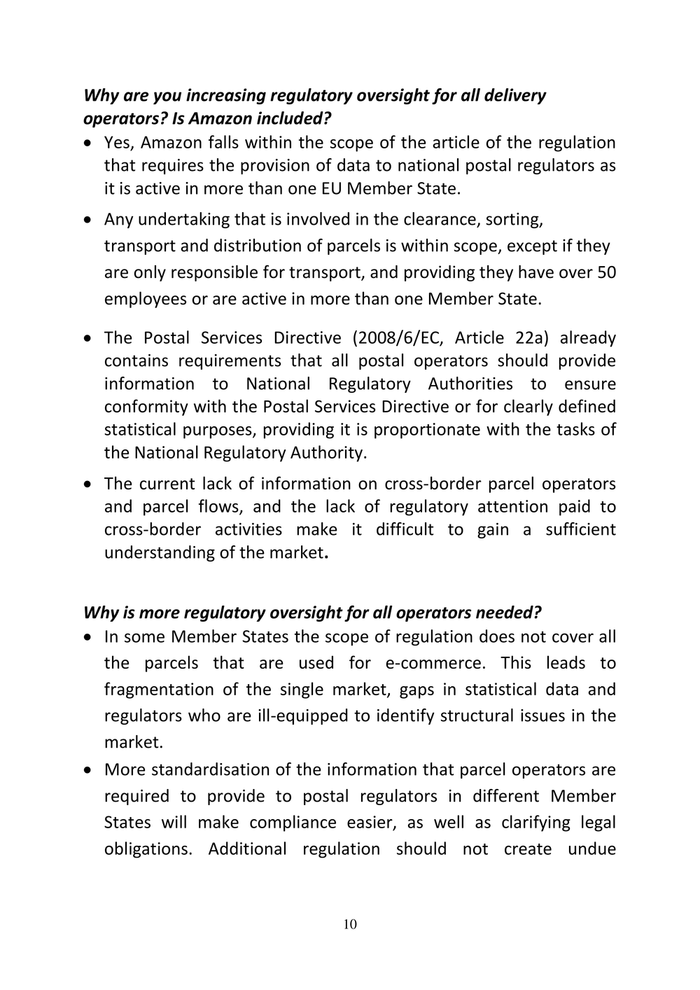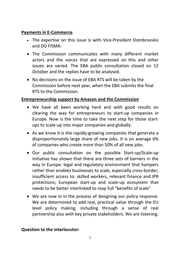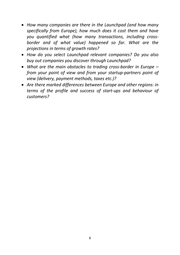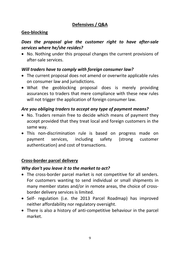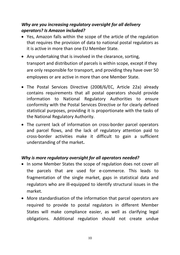Doc12-Ares20194753931
Dieses Dokument ist Teil der Anfrage „Interactions with Amazon“
Ref. Ares(2019)4753931 - 22/07/2019 DG GROW Meeting between Commissioner BIEŃKOWSKA with Mr. VP, Amazon EU Retail Brussels, 13 October 2016, 15h00 Name of Cabinet Member: Fabrice Comptour Name of the Director who has cleared the briefing: Hubert GAMBS BASIS request ID: CAB 459 Room, time: Name of main contact person: Telephone number: Directorate/Unit: E/3 BRIEFING NOTE: Amazon and EU Regulation of e-Commerce and Entrepreneurship support Scene setter/Context of the meeting: You will meet Mr. who is vice-president at Amazon and responsible for Amazon's retail business in EU. The meeting is expected to concern DSM (geoblocking, Parcel delivery & Platforms), E-Commerce (Counterfeit MoU/IPRED, Product safety & payment Issues) and Start-ups/Scale-ups. The focus of the meeting is expected to be on the E-commerce topics in particular. Within the DSM initiative, the Commission has adopted or will adopt regulatory proposals affecting e-Commerce. Amazon is expected to support Commission's proposals to regulate E-Commerce on geoblocking, Parcel delivery and Online Platforms and will present its views about proposed or future regulation on IPR Enforcement, Product Safety and Online payments. In IPR enforcement, the role of online intermediaries is one of the main issues to be analysed in the IPRED REFIT analysis and possible review. Amazon replied to the public consultation on the IPR enforcement framework, that IPRED achieved its objectives and there is no need to review it. Please note that in the Platform Communication, the Commission announced that it will not touch the e-Commerce Directive, which regulates platform liability. 1

On payments, Amazon wishes to discuss its concerns about the draft Regulatory Technical Standards (RTS) prepared by the European Banking Authority (EBA) on "Strong customer authentication and secure communication (SCA-SC)", on the basis of the mandate given in the new Payment Services Directive (2015/2366/EU), presently subject to a public consultation. The payments file is in the portfolio of Vice-President Dombrovskis. The issue at stake is technical and highly sensitive politically; DG FISMA advises prudence and circumspection. Amazon will present its entrepreneurship support activities (Market Place and "Launch Pad" programme) and would like to explore possible cooperation with the Commission Start-up initiative (DG GROW). Objective of the meeting: Exchange of views including to inform about the outcomes of the public consultation and indicate possible directions in the European start-up and scale-up policy. Find out in more detail Amazon's start-ups support strategy and view so far on their partnering up with start-ups in Europe as well as our entrepreneurial ecosystem. 2

MAIN KEY messages • Companies may tailor their offers to the markets they target but have to treat customers from another Member State as they treat local customers, not better, nor worse. • Too many non-compliant products are placed onto the Single Market, including through online sales and via imports from non-member countries. • We are faced with a very difficult and complex reality, where commercial scale IPR infringement activities have become more frequent and therefore very harmful to the EU economy. • We are currently evaluating the overall functioning of the current legal framework of IPR enforcement. • Payment in E-commerce is in the portfolio of Vice-President Dombrovskis and DG FISMA. KEY messages Geo-blocking • Unless it can be justified, companies should no longer discriminate their customers according to their place of residence or place of establishment. Customers from abroad should be treated in the same way as local customers. • The proposal fully respects the freedom of enterprises to adapt their general conditions of access, including prices, to the markets they target. The regulation allows for seasonal sales or special promotions as well and does not oblige companies to deliver or to provide cross-border after-sale services. • To increase transparency, the proposal bans blocking access to websites and automatic re-routing. Traders are free to choose the technological means to implement these rules. 3

Cross-border parcel delivery • Improving cross-border parcel delivery services is a high priority for the Commission, as a step towards completing the digital single market. The Commission wants to see rapid and tangible progress to improve the quality of service and affordability. • The Commission welcomes innovation and competition in the parcel sector that brings consumers choice and better quality delivery services. Our proposal for a regulation on cross-border parcel delivery aims to encourage choice and competition. • Now that it's not only national postal operators that delivery parcels to consumers, regulators need to know which companies are active on parcel markets. The proposal for a regulation on cross-border parcel delivery has been designed to minimise the administrative burdens it will impose on companies. In some Member States postal regulators already ask for this information from parcel delivery companies. • Only universal service providers will be required to submit their prices to national postal regulators who will be required to assess affordability. The Commission has no plans to propose price regulation. Question to the interlocutor: What are Amazon's plans for expanding its delivery services in Europe? Unfair B2B practices in Platforms • Online platforms are instrumental for the DSM and enabling SMEs to access a wider market. Due to the possible dependency of small business users on platforms we need to be sure that platforms behave in a responsible, fair and transparent way. 4

• No plans for any horizontal regulation. Considering the quickly changing online environment, voluntary efforts and self-regulation of market players could be one of the ways forward. • We launched an in-depth fact-finding exercise to verify whether unfair B2B practices could risk impacting innovation or market access. We are glad we can count on Amazon's cooperation in this exercise. IPR Enforcement in e-Commerce • We are faced with a very difficult and complex reality, where commercial scale IPR infringing activities became more frequent and therefore very harmful to the EU economy, and in particular to the individuals and companies who are supposed to benefit from these rights. • Online intermediaries, unwittingly and by the very nature of their legitimate business activities provide the infrastructure for commercial scale infringers; therefore they will continue to play a key role in developing this policy, in our legislative as well as self- regulatory initiatives. • The Commission is evaluating the overall functioning of the current legal framework for IPR enforcement. An evaluation study has been launched; a dedicated public consultation ended in April and we will soon publish the results. • If this evaluation shows the need to review or complement the directive, the Commission will later make its proposal(s), in line with the wishes of the Member States and the European Parliament. Proposals for an IPRED review are expected not before the end of 2016. Since the initiative also became a REFIT exercise we will also adopt an evaluation report. 5

• Progress has also been made on setting up self-regulatory "follow the money" schemes between rightholders and intermediaries. The existing MoU on the sale of counterfeit goods via the Internet has been strengthened by the inclusion of Key Performance Indicators. This will mean that its impact will be measurable over time. It will also provide empirical evidence for future initiatives. • Together with the relevant stakeholder groups, DG GROW is developing cooperation schemes for three other intermediary services, namely advertising, payment and shipping service providers. DG GROW is also progressing with its work to ensure adequate protection of IP in supply chains. Question to the interlocutor: It would be useful to know more about the expectations of Amazon with regard to the modernisation of the IPR enforcement framework. Product safety in e-Commerce • Too many non-compliant products are placed onto the Single Market, including through online sales and via imports from non- member countries. • In 2017 the Commission will launch a comprehensive set of actions to strengthen market surveillance capacities in the EU and to step up efforts to keep unsafe products off the EU market. • The Single Market can only function well if the EU legislation on products is correctly implemented by everyone on the ground to maintain the highest level of protection and to safeguard the competitiveness of businesses across the EU. • The EU customer should be able to trust that products are compliant and safe, whether sold on- or offline and regardless of the business structure that may be behind an online platform. 6

Payments in E-Commerce • The expertise on this issue is with Vice-President Dombrovskis and DG FISMA. • The Commission communicates with many different market actors and the voices that are expressed on this and other issues are varied. The EBA public consultation closed on 12 October and the replies have to be analysed. • No decisions on the issue of EBA RTS will be taken by the Commission before next year, when the EBA submits the final RTS to the Commission. Entrepreneurship support by Amazon and the Commission • We have all been working hard and with good results on clearing the way for entrepreneurs to start-up companies in Europe. Now is the time to take the next step for those start- ups to scale-up into major companies and globally. • As we know it is the rapidly-growing companies that generate a disproportionately large share of new jobs. It is on average 6% of companies who create more than 50% of all new jobs. • Our public consultation on the possible Start-up/Scale-up Initiative has shown that there are three sets of barriers in the way in Europe: legal and regulatory environment that hampers rather than enables businesses to scale, especially cross-border; insufficient access to: skilled workers, relevant finance and IPR protections; European start-up and scale-up ecosystem that needs to be better interlinked to reap full "benefits of scale" • We are now in in the process of designing our policy response. We are determined to add real, practical value through the EU level policy making, including through a sense of real partnership also with key private stakeholders. We are listening. Question to the interlocutor: 7

• How many companies are there in the Launchpad (and how many specifically from Europe), how much does it cost them and have you quantified what (how many transactions, including cross- border and of what value) happened so far. What are the projections in terms of growth rates? • How do you select Launchpad relevant companies? Do you also buy out companies you discover through Launchpad? • What are the main obstacles to trading cross-border in Europe – from your point of view and from your startup-partners point of view (delivery, payment methods, taxes etc.)? • Are there marked differences between Europe and other regions: in terms of the profile and success of start-ups and behaviour of customers? 8
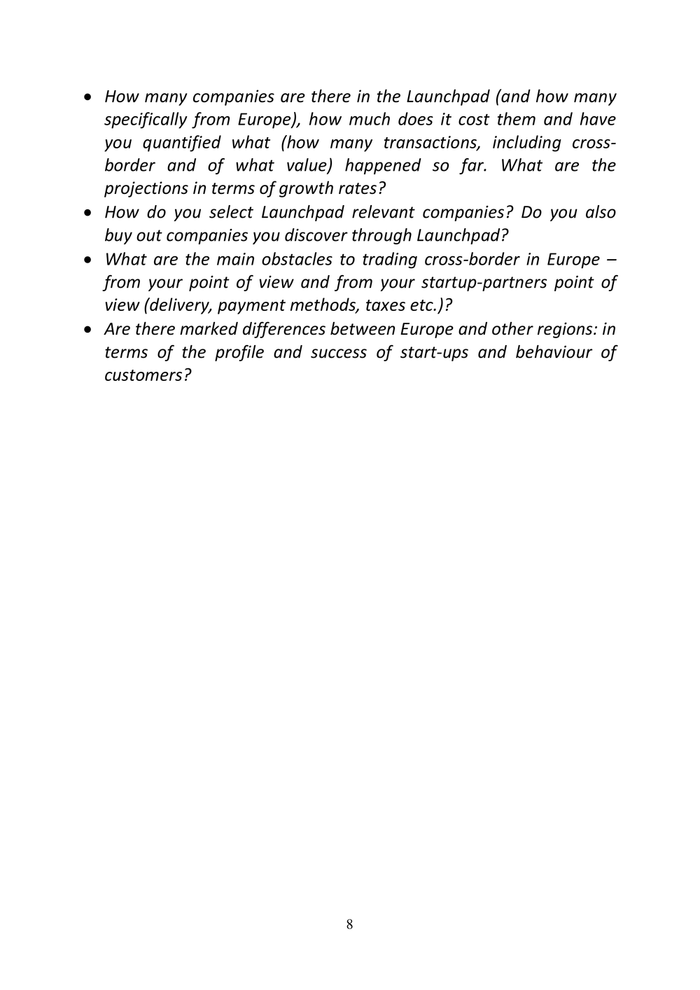
Defensives / Q&A Geo-blocking Does the proposal give the customer right to have after-sale services where he/she resides? • No. Nothing under this proposal changes the current provisions of after-sale services. Will traders have to comply with foreign consumer law? • The current proposal does not amend or overwrite applicable rules on consumer law and jurisdictions. • What the geoblocking proposal does is merely providing assurances to traders that mere compliance with these new rules will not trigger the application of foreign consumer law. Are you obliging traders to accept any type of payment means? • No. Traders remain free to decide which means of payment they accept provided that they treat local and foreign customers in the same way. • This non-discrimination rule is based on progress made on payment services, including safety (strong customer authentication) and cost of transactions. Cross-border parcel delivery Why don't you leave it to the market to act? • The cross-border parcel market is not competitive for all senders. For customers wanting to send individual or small shipments in many member states and/or in remote areas, the choice of cross- border delivery services is limited. • Self- regulation (i.e. the 2013 Parcel Roadmap) has improved neither affordability nor regulatory oversight. • There is also a history of anti-competitive behaviour in the parcel market. 9
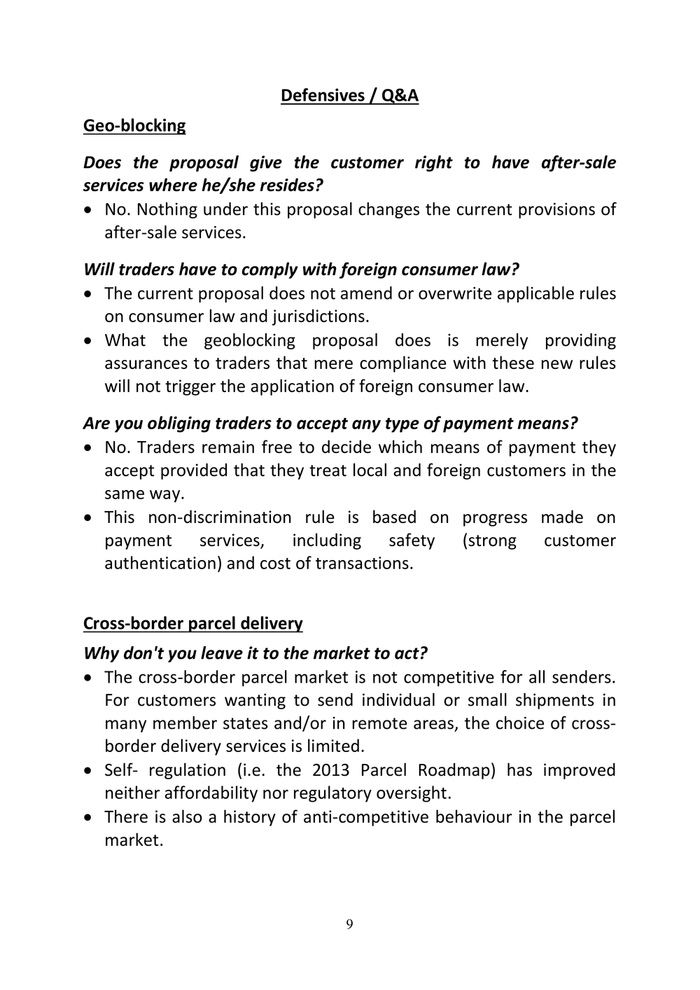
Why are you increasing regulatory oversight for all delivery operators? Is Amazon included? • Yes, Amazon falls within the scope of the article of the regulation that requires the provision of data to national postal regulators as it is active in more than one EU Member State. • Any undertaking that is involved in the clearance, sorting, transport and distribution of parcels is within scope, except if they are only responsible for transport, and providing they have over 50 employees or are active in more than one Member State. • The Postal Services Directive (2008/6/EC, Article 22a) already contains requirements that all postal operators should provide information to National Regulatory Authorities to ensure conformity with the Postal Services Directive or for clearly defined statistical purposes, providing it is proportionate with the tasks of the National Regulatory Authority. • The current lack of information on cross-border parcel operators and parcel flows, and the lack of regulatory attention paid to cross-border activities make it difficult to gain a sufficient understanding of the market. Why is more regulatory oversight for all operators needed? • In some Member States the scope of regulation does not cover all the parcels that are used for e-commerce. This leads to fragmentation of the single market, gaps in statistical data and regulators who are ill-equipped to identify structural issues in the market. • More standardisation of the information that parcel operators are required to provide to postal regulators in different Member States will make compliance easier, as well as clarifying legal obligations. Additional regulation should not create undue 10
